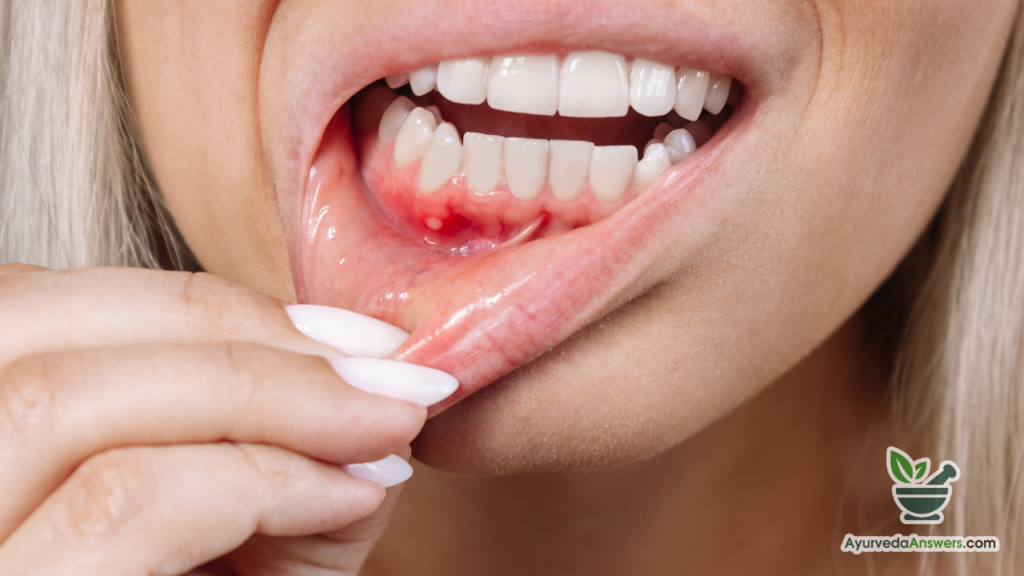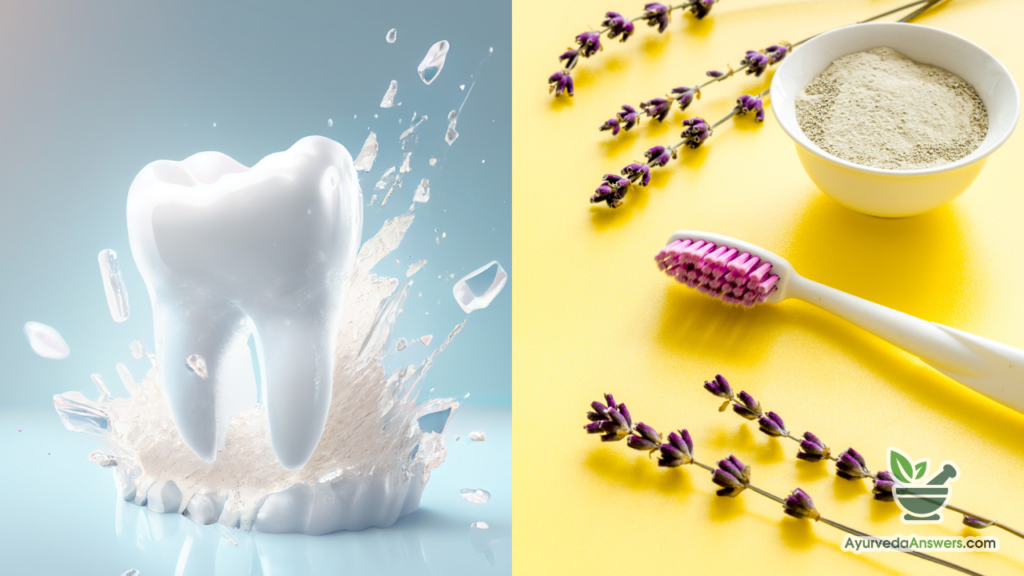Smile, they say, for it’s the curve that sets everything straight. But what if your smile starts to fade due to receding gums? Receding gums, medically known as gingival recession, can not only affect the aesthetics of your smile but also lead to serious dental issues if left untreated.

In the ancient wisdom of Ayurveda, oral health is considered paramount for overall well-being. Let’s explore the Ayurvedic perspective on receding gums, understanding its causes, symptoms, prevention, treatment, and the holistic care it deserves.
Receding gums can increase tooth sensitivity, damage, and decay risk. Let’s explore Ayurvedic perspectives on causes, prevention and natural treatments for this common gum problem.✨
What are Receding Gums?🦷

In Ayurveda, oral health is intricately linked to the balance of the doshas (Vata, Pitta, and Kapha) and the state of digestion (Agni). Receding gums are viewed as a manifestation of imbalances in these fundamental principles, leading to weakening and deterioration of the gum tissue.
Ayurvedic texts emphasize the importance of proper oral hygiene, dietary habits, and lifestyle practices to maintain healthy gums and teeth.
Receding gums refers to gum tissue that pulls away from the tooth, exposing sensitive root surfaces. The space between the gumline and teeth is called a periodontal pocket.
As pocket depth increases, gums recede further. This makes teeth looser and more prone to issues like sensitivity, decay and eventual tooth loss. 🦷
In Ayurveda, receding gums fall under the category of Danta Roga (dental diseases).
Excess Vata dosha accumulates in periodontal spaces, dries out gum tissue and causes recession. Aggravated Pitta also provokes gum inflammation (gingivitis).
Identifying and addressing the root causes can help regrow healthy gums again.💪
Symptoms of Receding Gums
Recognizing the signs and symptoms of receding gums is crucial for timely intervention and management. These may include:

- Visible Gum Recession: Noticeable reduction in the height of the gum tissue, especially around the teeth.
- Tooth Sensitivity: Increased sensitivity to hot, cold, or sweet foods and beverages due to exposed tooth roots.
- Bleeding Gums: Bleeding while brushing or flossing, indicating inflammation and gum tissue damage.
- Loose Teeth: Teeth feeling loose or shifting position, often a sign of advanced gum disease.
- Bad Breath: Persistent bad breath (halitosis) despite regular oral hygiene practices.
The earlier receding gums are noticed, the better the chances of reversing it. So be vigilant about gum health!
Causes of Receding Gums per Ayurveda 🌿
The main Ayurvedic emphasis is on pacifying elevated Vata-Pitta through wholesome diet, herbs and oral care. Now let’s explore how to prevent and treat receding gums.

Ayurveda identifies several underlying factors that contribute to receding gums, including:
- Vata Imbalance: Excess Vata dosha can lead to dryness, depletion, and weakening of the gum tissue, making it more prone to recession.
- Pitta Imbalance: Aggravated Pitta dosha can manifest as inflammation and heat in the gums, contributing to periodontal disease.
- Kapha Imbalance: Imbalances in Kapha dosha may lead to excess mucus and plaque accumulation, increasing the risk of gum disease.
- Weak Digestion: Poor digestion can result in the accumulation of toxins (ama) in the body, which can manifest as gum inflammation and disease.
- Poor Oral Hygiene: Inadequate brushing, flossing, and oral care routines can contribute to the buildup of plaque and bacteria, leading to gum recession.
Some other key factors that create an imbalance leading to receding gums:
❌ Vitamin C deficiency weakens connective tissue
❌ Hormonal influences like puberty, menopause
❌ Vigorous brushing traumatizes gum tissue
❌ Chronic smoking and tobacco use
❌ Systemic disease like diabetes
❌ Clenching/grinding teeth
❌ Genetic predisposition
Prevention: Nurturing Gum Health Naturally 🌱
Prevention is key to maintaining healthy gums and preventing receding gums:

- Proper Oral Hygiene: Brush teeth gently with a soft-bristled toothbrush and fluoride-free toothpaste, floss daily, and use an antimicrobial mouthwash to remove plaque and bacteria.
- Balanced Diet: Consume a diet rich in fresh fruits, vegetables, whole grains, and lean proteins to support overall health and nourish the gums.
- Hydration: Drink plenty of water throughout the day to keep the mouth moist and prevent dryness.
- Stress Management: Practice stress-reducing techniques such as yoga, meditation, and deep breathing to balance the doshas and promote relaxation.
- Regular Dental Checkups: Schedule regular dental cleanings and checkups to detect early signs of gum disease and address any issues promptly.
Some additional points to consider :
✅ Do gum massage with sesame oil – promotes circulation
✅ Avoid smoking/tobacco – irritates gum tissue
✅ Eat calcium-rich foods like sesame seeds, leafy greens
✅ Oil pulling with sesame or coconut oil strengthens gums
✅ Stay hydrated with pure water – avoids dry mouth
With diligent oral care and Vata-soothing self-care, gum recession can be halted before it worsens.
Ayurvedic Treatment for Receding Gums
If gum recession has already begun, Ayurveda aims to:
(1) Halt and reverse receding
(2) Regrow healthy gum tissue
(3) Protect against tooth damage/decay
(4) Strengthen the teeth and gums

This requires a holistic protocol:
🍃 Herbal powders for gum massage – clove, neem, turmeric
🪥 Medicated ghee like Khadiradi for swishing
🧘♀️ Yoga asanas like jaws open/close to increase blood circulation
🩺 Ayurvedic oral care – gentle brushing, oil pulling, tongue scraping
💧 Stay hydrated, rinse with warm salt water
🔬 Change brushing habits to avoid aggressive methods
🤸♀️ Vitamin C supplementation through diet – citrus, peppers, broccoli
👄 Avoid putting acidic, spicy, or sugary foods on receded areas
🍵 Anti-inflammatory herbs internally – turmeric, aloe, manjishtha
With these holistic interventions, receding gums can be regenerated and tooth integrity preserved. Patience and consistency are key!
Treatment: Healing from Within with Ayurveda 🌺
When receding gums occur, Ayurveda offers holistic treatment approaches aimed at addressing the root causes and promoting gum tissue regeneration:

- Oil Pulling (Gandusha): Swishing sesame oil or coconut oil in the mouth for 5-10 minutes daily can help reduce plaque, strengthen gums, and promote oral health.
- Herbal Remedies: Ayurvedic herbs like neem, triphala, licorice, and turmeric are known for their antibacterial, anti-inflammatory, and healing properties, which can support gum health.
- Gum Massage: Gently massaging the gums with herbal oils like sesame oil or neem oil can improve circulation, reduce inflammation, and promote tissue regeneration.
- Dietary Supplements: Taking Ayurvedic supplements like Amalaki (Indian gooseberry) or Guduchi (Tinospora cordifolia) can support immune function and overall oral health.
- Panchakarma Therapy: Detoxification treatments like Virechana (purgation) and Nasya (nasal administration of medicated oils) may be recommended to remove toxins and balance the doshas.
- Lifestyle Modifications: Adopting a healthy lifestyle that includes adequate sleep, regular exercise, and stress management practices can support overall well-being and oral health.
Nurturing Care: Embracing Self-Care and Healing 🌈
In addition to physical treatments, nurturing care is essential for promoting holistic healing and well-being:

- Self-Care Rituals: Incorporate self-care rituals like tongue scraping, mouth rinsing with warm salt water, and gentle gum massage into your daily routine.
- Mindful Eating: Chew food thoroughly and mindfully to aid digestion and prevent the accumulation of plaque and bacteria in the mouth.
- Hygiene Habits: Avoid tobacco use, excessive alcohol consumption, and sugary or acidic foods and beverages that can erode tooth enamel and contribute to gum recession.
- Emotional Wellness: Cultivate positive emotions and self-awareness through practices like gratitude journaling, nature walks, and spending time with loved ones.
- Professional Support: Seek guidance from qualified Ayurvedic practitioners and dental professionals to develop a personalized treatment plan and address any underlying issues effectively.
Dietary Guidelines from Ayurveda

Diet is deeply connected to oral health. Here are some Ayurvedic dietary tips:
✅ Emphasize fresh fruits and vegetables – provide vitamins, minerals
✅ Eat calcium-rich foods – sesame, spinach, almonds, dairy
✅ Avoid sticky, sugary foods that adhere to teeth
✅ Stay hydrated with pure water – combats dry mouth
✅ Limit astringent foods like beans, raw veg, unripe fruits
✅ Incorporate oral rejuvenates like amla, triphala, ghee
✅ Drink fresh vegetable juices for vitamins and minerals
✅ Spice meals with turmeric, cumin, coriander for added benefits
With wise food choices we nourish the teeth, gums and oral microbiome from within!
Key Herbs for Oral Health
Specific herbs that benefit gum health and can be applied topically or taken internally include:

🍃 Aloe Vera – Anti-inflammatory, healing, antiseptic
🌿 Neem – Antibacterial, reduces plaque, strengthens gums
🍀 Triphala – Detoxifying, rich in vitamin C
🧂 Himalayan salt – Alkalizing, antibacterial, mineralizing
🍋 Lemongrass – Astringent, stimulates circulation
🌶 Cayenne – Improves blood flow, rich in vitamins
🧄 Garlic – Stimulates immune response, antiseptic
Guidance from an Ayurvedic practitioner can help choose the right herbs and treatment combination.
The key is patience and consistency. With diligent oral hygiene, gum-rejuvenating foods and herbs, the gums can re-attach to the teeth again. Smile brightly knowing receding gums can be healed!😁👍
Conclusion
Receding gums may present challenges, but with the wisdom of Ayurveda, we can nurture our oral health naturally and restore balance to our bodies and minds. By understanding the root causes, embracing preventive strategies, and seeking holistic treatments, we can cultivate vibrant gum health and greet the world with a confident and radiant smile.
Let’s honor the ancient wisdom of Ayurveda and embark on a journey toward lifelong oral well-being, one mindful breath and smile at a time. 😊🌿🦷
Disclaimer : The techniques described in these articles are not intended as substitutes for professional medical advice or treatment. Consult a physician before trying any new health treatment. Do not stop or change prescribed medications without consulting your healthcare provider. The information provided is for educational purposes only. Results will vary based on individual factors. Always rely on the guidance of a qualified medical professional for any health concerns.
Read Our Latest Articles :
- Ayurveda for Disc Bulge: Finding Relief Naturally
- Ayurveda for Alopecia Areata: Nurturing Hair Health Naturally
- Ayurveda for Asthma: Breathe Easy with Natural Solutions
- Ayurveda for Melasma: Embracing Natural Solutions for Clear, Radiant Skin
- Ayurveda for Dampness in the Body: Embracing Balance and Vitality
Leave a Reply